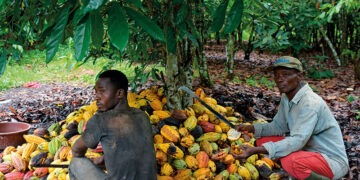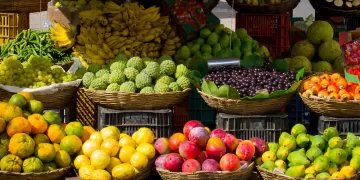Ghana’s fruit and vegetables market is projected to register a compound annual growth rate (CAGR) of 5.3 percent during the forecast period, 2021-2026.
The projection, made by Mordor Intelligence – a market research and intelligence consulting firm, attributed the projected low growth rate in revenue to continuous impacts of the COVID-19 pandemic.
The United Kingdom and European Union continue to be the major importers of Ghanaian fruit – notably Germany, Switzerland and Italy, among others. With the domestic fruit processing growth and regional exports, the demand for fruit is expected to grow during the forecast period.
Last year, the Vegetable Producers and Exporters Association of Ghana (VEPEAG) said 200 of its members lost a total of US$1.6million to the pandemic. As an impact of COVID-19, the horticulture sector in Ghana was highly affected by measures taken to prevent spread of the coronavirus.
Incomes were decreased as export stopped, and farmers lost their money as the virus disrupted the key export markets in Europe. Currently, producers lack enough funds to finance and invest in the upcoming seasons.
According to the Ministry of Food and Agriculture (MoFA), Ghanaian vegetable and fruit exporters were unable to send consignments to their buyers in Europe and other international markets due to lack of demand caused by the COVID-19 pandemic.
Meanwhile, the growing middle-class with heightened health awareness of consuming vegetables – coupled with the rise in fruit processing units, is fuelling the market growth for fruit and vegetables.
Chilies, onions, tomatoes, okra, eggplant and beans are some of the major vegetables produced in the country. Tomatoes had the largest share among the vegetable segment of the market studied. The United Kingdom, United States, Netherlands and United Arab Emirates are some of the major importers of fruit and vegetables from Ghana.
The demand for fresh fruit such as pineapples is very high, mostly intended for exports, traditional domestic markets, supermarkets and fruit processing. There is also a growing demand for fresh fruit to use in processed products and juices, among others, for local consumption and export.
In order to boost the regional fruit trade, many companies – such as Blue Skies, HPW Fresh & Dry – have set up processing units in Ghana; mainly for export and partly for domestic consumption. These establishments have nonetheless helped tackle the problem of post-harvest losses due to inadequate and semi-enhanced storage facilities in the country.
















































